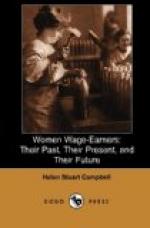Few more significant words or words more teeming with importance on the actual economic condition of women have ever been written than those of the great jurist whose name counts as almost final authority. “Ancient law,” he writes, “subordinates the woman to her blood relations, while a prime phenomenon of modern jurisprudence has been her subordination to her husband.” Under the modified laws as to marriage, he goes on to state, there came a time “when the situation of the Roman female, unmarried or married, became one of great personal and proprietary independence; for the tendency of the later law, as already hinted, was to reduce the power of the guardian to a nullity, while the form of marriage in fashion conferred on the husband no compensating superiority.”
These were the final conditions for the Roman, whose power, sapped by long excesses, was even then trembling to its fall. Already the barbarians threatened them, and at various points had penetrated the Empire, showing to the amazed Romans morals absolutely opposed to their own. The German races contented themselves with one wife; and Tacitus wrote of them: “Their marriages are very strict. No one laughs at vice, nor is immorality regarded as a sign of good breeding. The young men marry late,—they marry equal in years and in health, and the strength of the parent is transmitted to the children.”
This has a rosier aspect than facts warrant. For the Germans, as for other barbarians of that epoch, the patriarchal family was the social order, and the head of the family the lord of the community. Wives, daughters, and daughters-in-law were excluded from leadership, though in spite of this there is record of a woman as being occasionally at the head of a tribe,—a circumstance chronicled by Tacitus with much disgust.
While from the West this gigantic wave of powerful but uncultured life was flowing in, from the East had come another. Early Christianity had already established itself, and its ascetic teachings made another element in the contradictions of the time. Up to this date slavery had been the foundation of society, and any amelioration in the condition of women had applied only to the patrician class. The Carpenter of Nazareth set his seal upon the sacredness of labor, and taught first not only the rights but the immeasurable value of even the weakest human soul. Women were ardent converts to the new gospel. Hoping with all the wretched for redemption and deliverance from present evils, they became eager and devoted adherents. Their missionary zeal was a powerful agent in the early days of Christianity. “In the first enthusiasm of the Christian movement,” says Principal Donaldson, in his notable article on “Women among the Early Christians,” in the “Fortnightly Review,” “women were allowed to do whatever they were fitted to do.”
All this within a few generations came to an end. Widows of sixty and over retained the power which had been given, and a new order arose,—deaconesses who were not allowed marriage. Neither widows nor deaconesses could teach, the Church being especially jealous in this respect and in substantial agreement with Sophocles, who said, “Silence is a woman’s ornament.”




